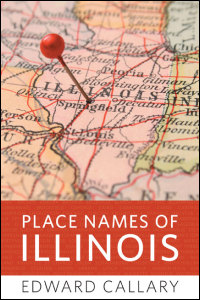 The official publication date of Edward Callary’s Place Names of Illinois has arrived. I conclude our month-long feature with the derivation of our state’s name.
The official publication date of Edward Callary’s Place Names of Illinois has arrived. I conclude our month-long feature with the derivation of our state’s name.
Illinois. State. The name is from the Illinois, a group of loosely organized but independent tribes—often described as a confederation—which spoke a common language and shared a number of historical and cultural traditions. The number of tribes composing the Illinois is variously reported but include the Kaskaskia, Cahokia, Tamaroa, Peoria, and Michigamea. The language of the Illinois was nearly identical with that of the Miami and is usually referred to as Miami-Illinois. Illinois is not the name the Illinois people called themselves; rather, they were the Inoca, a name of unknown origin and meaning. The name from which Illinois is derived apparently originated in the Miami dialect of Miami-Illinois and was taken into Ojibwa, where it was modified to fit Ojibwa morphology and phonology. It was recorded in 1640 as Eriniouai, in 1656 as Liniouek, in 1657 as Aliniouek, and about 1666 as Iliniouek (pronouned approximately ilinoowek]). The name was subsequently taken into French, where the Ojibwa plural suffix –wek was changed to French –ois (The pronounciation at this time was approximately [ilinway].) By the early 1670s the name began to appear in its current form. (For an extended—albeit technical—discussion of the etymology of Illinois, see Costa, “Illinois.”) As far as can be determined, the first to offer a meaning for the name was Marquette, who wrote, “When one speaks the word ‘Illinois’ it is as if one said in their language ‘the men,’—As if the other Savages were looked upon by them merely as animals.” This interpretation was extended and embellished over the years, and the word has been claimed to mean “excellent people,” “superior people,” or “perfect and accomplished people.” Costa finds these interpretations to be little more than popular etymologies and offers the translation “I speak in the regular way” or “I speak my language.” At least one ingenious popular etymology of Illinois has been reported (apparently seriously) by no less an authority than a governor of Illinois. In his Pioneer History of Illinois, John Reynolds offered a second etymology: that the name was an English adaptation of French ÃŽsle aux Nois [sic] (Island of Nuts), a name early French explorers gave to an island in the Mississippi River that abounded in black walnut groves. There is no evidence to support this claim other than the fact that the French did bestow that name on a number of occasions (there are four ÃŽles aux Noix in Quebec alone). Illinois was admitted to the union as the twenty-first state on Dec. 3, 1818. The northern boundary was to have been near the foot of Lake Michigan, at the approximate latitude of the current northern boundary of Indiana. Through the efforts of Nathaniel Pope (for whom Pope County is named and the territorial representative in Congress), the boundary was moved some fifty miles north (Bright, Native American Placenames; Costa, “Illinois,” 46—47; Reynolds, The Pioneer History of Illinois, 24).
